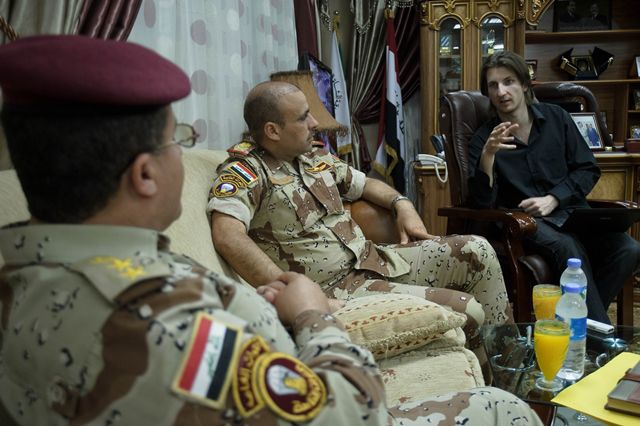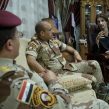
Jamestown Interview: Iraqi General in Mosul Under Pressure From Islamist and Nationalist Groups
Publication: Terrorism Monitor Volume: 9 Issue: 20
By:

The commander of the Mosul-based Second Division of the Iraqi Army, Major General Nasser al-Ghannam, claims he has improved security in the former insurgent hotbed of Mosul and does not need any further support from the United States Army. The general, however, has serious opposition of his own in Mosul. His principal opposition comes from the Mosul governor and his Sunni Arab nationalist party, al-Hadba.
The general, a Sunni Muslim from Anbar, told Jamestown: “Since 2010, we conducted many missions and detained hundreds of these [militant] groups. There is good coordination and cooperation with civilians.” [1] While Mosul was partially controlled by insurgents in the past, he says those insurgents are now on the run: “Most casualties are from IEDS now; the enemy is afraid now and can’t fight face to face” (for the militant groups operating in Niniwa, see: Terrorism Monitor Briefs, May 26, 2009).
General al-Ghannam added that the recent unrest in Syria has also helped to decrease external support for insurgents: “They [Syrian intelligence] are busy with the fight within their own country, not in Iraq.” This was confirmed by a Kurdish counterterrorism official in Erbil who also said that Syrian security agencies are occupied with the current unrest in that country. [2] According to the general, 85% of the insurgents currently in Mosul are Iraqi, while only 15% are foreign jihadis.
Statistics seem to confirm that security is improving in Mosul (the capital of Niniwa province), although the province as a whole remains one of Iraq’s most dangerous. [3] Violence in Mosul has decreased remarkably over the past two years. In the first quarter of 2008 there were 1,167 recorded attacks using improvised explosive devices (IEDs). In the second quarter of 2010, there were only 78 (Christian Science Monitor, July 9, 2010).
Whether this is directly related to the operations of the Iraqi army is unclear. The decrease in violence might also be related to the election victory of Sunni nationalist Al-Hadba in the 2009 provincial elections. According to Dildar Zebari, deputy head of the provincial council, the decrease is related to the end of the Sunni boycott of electoral politics in Mosul, where the majority of the population is Sunni Arab. [4]. “Nobody can claim this improvement as their achievement, it’s of the people,” Zebari said.
According to Khasro Gorran, Niniwa’s Kurdish former deputy governor, it is true that the army has improved security [5]. “I can tell you they are controlling 85% of the city now. The situation is much better from the previous years.”
However, Mosul’s police still lack professionalism and suffer from infiltration, corruption and even drug addiction. Failure to follow security protocols was said to be behind the killing of police colonel Eid al-Namis in the Namroud area of Mosul on May 3. “It’s his mistake,” said general al-Ghannam. “Because he goes to his house every day, the same road,” added Brigade Commander Rebwar Younis Abdullah.
The Iraqi army in Mosul has also been praised by others for improving security. A news forum user named Abu-Sa’ad wrote that the Iraqi army succeeded in bringing back security. “He [Ghannam] managed, despite a young age, to achieve miracles and bring life back to the university…,” he wrote (alhadbaa.in-goo.com, December 16, 2010). He added that car show rooms were reopened in the industrial districts, which were controlled by insurgent groups in the pasts. “The fear barrier was broken by the citizens, as shown by conferences attended by hundreds of shaykhs in Mosul,” he wrote.
Local television broadcast an appeal by General al-Ghannam to the shaykhs of the different Sunni Arab tribes in the region asking them not to support the insurgents, as the insurgents make no distinction between Muslims and non-Muslims in their attacks.
Al-Ghannam said the situation improved greatly after 2010. “The situation was bad in 2007, 2008, 2009. But after 2010 we had a good security plan with the police. All units are under our command. You can see this university is much better with thousands of students coming from Kurdistan, South-Iraq, Christians and Muslims.” He even claimed Christians were returning. “The patriarch thanked me in a letter, the churches are open and thousands of people go to these celebrations.”
However, the fact that al-Ghannam was appointed by Iraqi Prime Minister Nuri al-Maliki as the Second Division commander has resulted in problems with the local provincial authorities. The provincial governor accused the Iraqi army of torturing demonstrators and shooting civilians. Mosul governor Atheel al-Nujaifi asked for the removal of al-Ghannam, a request the Iraqi prime minster refused (Niqash.org, March 2).
Al-Nujaifi asked the military to end the closing of al-Ahrar square, where demonstrations took place against the U.S. Army presence in Iraq from April 9 to April 26 (Aswataliraq.info, April 27). The Iraqi army claims Ba’athists and insurgents were behind the recent demonstrations (Dar al-Hayat, April 27). According to former deputy governor Khasro Gorran, the alleged Ba’athists were trying to use the recent demonstrations against the army.
Niniwa’s governor and his allies see the Iraqi army as a pro-Iranian Shiite dominated occupation army over which the Sunni Arabs have no control. “The governor wants the Iraqi army under his control, but the Iraqi army wants the army controlled by its commanders. That’s why the governor is spreading rumors that the army is Iranian, but this is not true,” said Colonel Rewbar Younis Abdullah, who heads the Fifth Brigade of the Iraqi Army’s Second Division in Mosul.
According to al-Hadba party member Dildar Zebari, the Second Brigade “is a tool in the hands of Maliki” and his State of Law party which “didn’t receive any seats during the provincial elections and the parliamentary elections in Mosul.”
Despite security improvements and political tensions, Islamist and nationalist insurgents still play a major role in Mosul. The overt presence of insurgent groups has decreased, but these groups have simply gone underground and focused on more criminal activities like kidnapping, extortion and assassinations (Niqash.org, April 6).
Notes:
1. Interview with Nasser Ahmad al-Ghannam, May 3, 2011.
2. Interview with counterterrorism official in Erbil, May 10, 2011.
3. See https://musingsoniraq.blogspot.com/2010/02/casualties-in-mosul-continue-to-drop-in.html.
4. Interview with Dildar Zebari, deputy chairman of the local provincial council in Mosul and member of the al-Hadba party. Al-Hadba is allied with the Iraqiya list that failed to form the government.
5. Interview with Niniwa’s former deputy governor Khasro Gorran and head of the second-largest party in Mosul, the Kurdish Brotherhood list, May 6, 2011.





